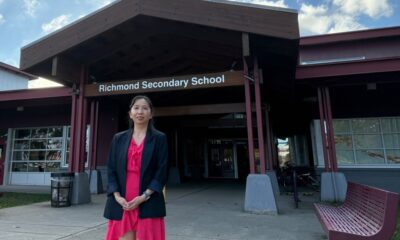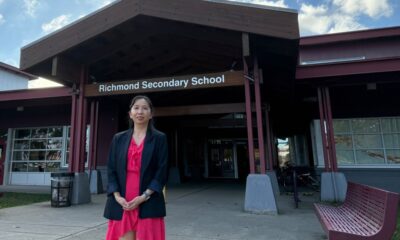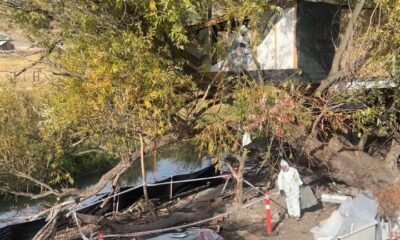Politics
Court Ruling Threatens Homeownership in Richmond, B.C.

About 150 homeowners in Richmond, British Columbia, received alarming news this week. Letters from the city’s mayor, Malcolm Broday, informed them that an August 2023 ruling by the B.C. Supreme Court could jeopardize their property ownership. The decision, if upheld after an appeal by the city and province, may nullify the homeowners’ titles to properties they have owned for decades.
The ruling stems from a case involving the Cowichan First Nations, which claimed an 800-acre site along the Fraser River as an ancestral summer fishing village more than 150 years ago. Justice Barbara Young ruled that this historical use grants the Cowichan First Nations “Aboriginal title” over the land, which includes both public and private properties valued at over $500 million. Aboriginal title allows Indigenous groups to occupy, use, and profit from lands, with the stipulation that such land can only be sold to the Crown.
British Columbia presents a unique challenge in this context, as it lacks the extensive treaty agreements seen in other parts of Canada. The province was claimed by the British government in 1846 without formal treaties with Indigenous populations. This recent court ruling raises concerns that it could set a precedent for further challenges to both Crown title and private property rights.
The implications of this ruling could extend beyond Richmond. Should the case reach the Supreme Court of Canada and be upheld, it may reshape the landscape of land ownership rights across the nation. The notion of reconciliation, often discussed in terms of acknowledging past injustices, appears increasingly tilted towards recognizing Indigenous claims in ways that could impact non-Indigenous property owners.
Over the past two years, some provincial parks in British Columbia have faced temporary access restrictions based on race. For instance, Joffre Lakes Provincial Park, a popular destination, has been closed to non-Indigenous visitors during specific periods to accommodate First Nations’ spiritual practices and natural resource gathering. Such developments have sparked debate over the balance of rights and the role of non-Indigenous Canadians in the reconciliation process.
While many support efforts for Indigenous communities to share in the economic benefits of their traditional lands, there are growing concerns that claims to exclusive use of public lands could lead to further divisions. The Richmond ruling adds to these complexities, as it raises the possibility of First Nations seeking exclusive rights to private property as well.
In Manitoba, the Sagkeeng First Nation has recently posted a land claim, prohibiting hunting and fishing without prior approval from their chief and council. They assert their historical occupation of the lands, emphasizing their longstanding connection to the territory.
Despite the potential challenges posed by the Richmond decision, there are alternative pathways to mitigate the impact on homeowners. If arrangements can be made for annual lease payments to the First Nation rather than traditional property taxes, some of the adverse effects may be lessened. However, this solution remains speculative.
The uncertainty surrounding land ownership rights in Richmond could significantly affect property values. Prospective buyers may hesitate to invest in properties where ownership is in question. The evolving landscape of land claims and the interpretation of Aboriginal title require careful consideration and dialogue among all stakeholders involved.
-

 World3 months ago
World3 months agoScientists Unearth Ancient Antarctic Ice to Unlock Climate Secrets
-

 Entertainment3 months ago
Entertainment3 months agoTrump and McCormick to Announce $70 Billion Energy Investments
-

 Lifestyle3 months ago
Lifestyle3 months agoTransLink Launches Food Truck Program to Boost Revenue in Vancouver
-

 Science3 months ago
Science3 months agoFour Astronauts Return to Earth After International Space Station Mission
-

 Technology2 months ago
Technology2 months agoApple Notes Enhances Functionality with Markdown Support in macOS 26
-

 Top Stories2 weeks ago
Top Stories2 weeks agoUrgent Update: Fatal Crash on Highway 99 Claims Life of Pitt Meadows Man
-

 Sports3 months ago
Sports3 months agoSearch Underway for Missing Hunter Amid Hokkaido Bear Emergency
-

 Politics3 months ago
Politics3 months agoUkrainian Tennis Star Elina Svitolina Faces Death Threats Online
-

 Technology3 months ago
Technology3 months agoFrosthaven Launches Early Access on July 31, 2025
-

 Politics3 months ago
Politics3 months agoCarney Engages First Nations Leaders at Development Law Summit
-

 Entertainment3 months ago
Entertainment3 months agoCalgary Theatre Troupe Revives Magic at Winnipeg Fringe Festival
-

 Politics2 weeks ago
Politics2 weeks agoShutdown Reflects Democratic Struggles Amid Economic Concerns





















